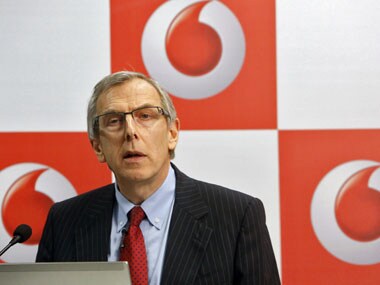New Delhi: Vodafone India is on a roll. Despite frequent complaints over regulatory uncertainty in India and a much publicised tax dispute, India’s second largest mobile phone operator has reported robust financials for the September quarter and half year.
As it gets ready to participate in upcoming spectrum auctions, to make Indian operations a wholly owned subsidiary by buying out shareholders, and maybe to also look at growing in India through mergers and acquisitions, Vodafone India’s MD and CEO Marten Pieters spoke to Firstpost at length.
[caption id=“attachment_1225691” align=“alignleft” width=“380”]
 Vodafone India CEO Marten Peiters Reuters[/caption]
Vodafone India CEO Marten Peiters Reuters[/caption]
He touched upon incremental investments, about how the pricing debacle and regulatory uncertainties cost the company about two years of growth and how the future for the Indian telecom market lies in consolidation.
China, he says, has three operators only against India’s 12. The three Chinese operators invested a humungous $55 billion in that country’s telecom business last year compared to less than $5 billion investment by Indian telcos.
Clearly, India has a lot of catching up to do and the only way forward for the telecom industry seems to be a drastic reduction in the number of telcos alongside a stable policy environment.
A report by Goldman Sacs analysts this evening points out that Vodafone’s strong results imply that the larger telcos (like Bharti/Idea along with Vodafone) continue to benefit from a benign competitive environment and the telecom industry will likely consolidate in favour of three biggies Bharti, Vodafone and Idea Cellular.
Impact Shorts
More ShortsThese analysts have also said “we now see the possibility that Vodafone may increase its incremental market share at the expense of Bharti/Idea if 1) Vodafone follows an aggressive investment approach and consequently benefits more from data than Bharti/Idea; 2) Bharti/Idea are slow in making incremental data investments.”
Well, the two other biggies of telecom had better be listening. Excerpts from Pieters’ chat:
On further investments into India:
Under Project Spring, Vodafone Group Plc will bring in an incremental investment of Rs 7000 crore, which is over and above the annual capex already earmarked for India, between April 2014 and April 2017. The fresh investment does not include monies that Vodafone may use to buy additional spectrum in 2G or 3G in India. It has already said annual capex for Indian operations will be Rs 4000-5000 crore. The incremental investment will be used to beef up network, primarily for data and 3G services.
On how Government is penalising big telcos for expansion:
Two issues here. First is the spectrum usage charge, which goes up with each mhz of spectrum. Telecom regulator TRAI has already advocated a flat charge… as of now, big telcos like us are paying almost 7.5 times SUC per mhz of spectrum versus smaller telcos. This is like the Government penalising big telcos for buying up more spectrum, it discourages efficient use of spectrum.
The second issue of calculation of Adjusted Gross Revenue (AGR), where again the industry has no clarity on why forex gains form a part of this calculation besides profits on disposal of assets. Why then are we not allowed to deduct losses on account of asset sales from AGR calculation? This issue needs to be resolved so the entire industry benefits.
On growing in India through M&A:
We are happier now that the Government seems to have arrived at a definite 50% subscriber market share cap for M&A in each circle, at least now we know where we stand. When 35% market share cap was being discussed, it was almost impossible to think of merger/acquisition of a medium player, now that is possible. Having said that though, various considerations will drive consolidation in the market.
Some operators may have 900 mhz spectrum in some circles we might want, some others may have 3G spectrum - we don’t have any 3G spectrum in 12 circles. In some other circles another player may give us a good market position. So it will differ from circle to circle. Also, spectrum trading may be a better solution than an actual M&A, but this depends on the debt situation of the target company. Also, we prefer buying fresh spectrum from an auction than taking it through any of these routes. New spectrum will hopefully come with a 20-year validity against 15-16 years’ validity if it is traded.
On the Indian journey so far:
We are very happy with our performance in India so far. We came in when the brand also got changed from Hutch to Vodafone, tariffs were very low in the market. But we have managed to grow revenue market share by a percent in each of the last five years, made an initial big investment in seven circles, began our enterprise business from scratch and are now beginning the mpesa business - again from scratch. Our profitability has increased, cash available has gone up and we have done well in all other parameters. Only, had six new operators not begun a price war when we were just finding our feet, we would not have lost 1-2 years of growth.
On raising tariffs:
India has seen low tariffs for the last 18 years but now, they need to go up. We are not saying tariffs should go up as much as inflation but they will increase.
On parent buying out local partners and infusing fresh equity:
We have already applied to FIPB for permission to convert Vodafone India into a wholly owned arm. In that application, there is also a mention of infusion of fresh equity by the parent company but this will depend on a lot of factors.
)